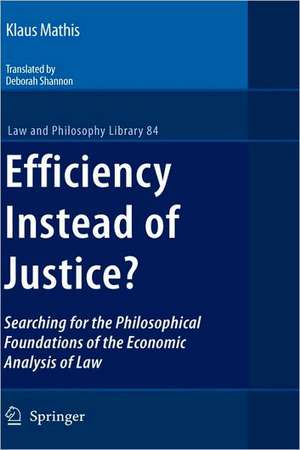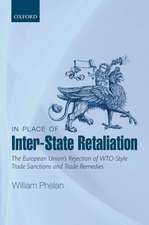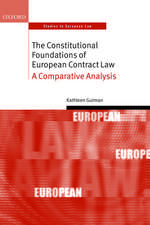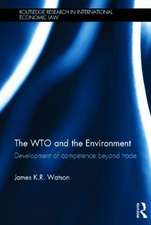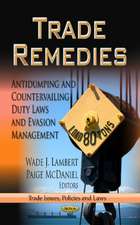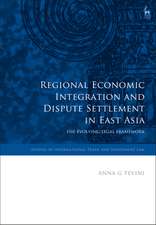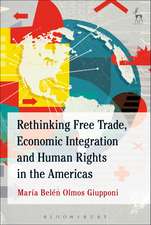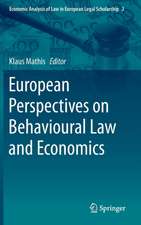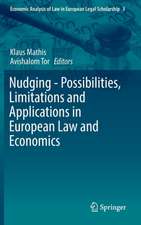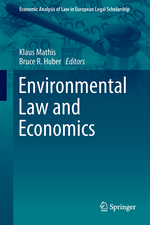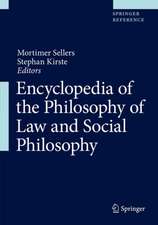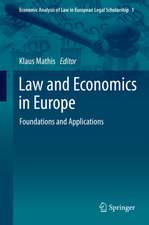Efficiency Instead of Justice?: Searching for the Philosophical Foundations of the Economic Analysis of Law: Law and Philosophy Library, cartea 84
Autor Klaus Mathis Traducere de Deborah Shannonen Limba Engleză Hardback – 28 mar 2009
In this work, the lawyer and economist Klaus Mathis critically appraises Posner’s normative justification of the efficiency paradigm from the perspective of the philosophy of law. Posner acknowledges the influences of Adam Smith and Jeremy Bentham, whom he views as the founders of normative economics. He subscribes to Smith’s faith in the market as an ideal allocation model, and to Bentham’s ethical consequentialism. Finally, aligning himself with John Rawls’s contract theory, he seeks to legitimize his concept of wealth maximization with a consensus theory approach.
In his interdisciplinary study, the author points out the possibilities as well as the limits of economic analysis of law. It provides a method of analysing the law which, while very helpful, is also rather specific. The efficiency arguments therefore need to be incorporated into a process for resolving value conflicts. In a democracy this must take place within the political decision-making process. In this clearly written work, Klaus Mathis succeeds in making even non-economists more aware of the economic aspects of the law.
| Toate formatele și edițiile | Preț | Express |
|---|---|---|
| Paperback (1) | 632.01 lei 43-57 zile | |
| SPRINGER NETHERLANDS – 28 oct 2010 | 632.01 lei 43-57 zile | |
| Hardback (1) | 643.84 lei 43-57 zile | |
| SPRINGER NETHERLANDS – 28 mar 2009 | 643.84 lei 43-57 zile |
Din seria Law and Philosophy Library
- 20%
 Preț: 813.10 lei
Preț: 813.10 lei - 20%
 Preț: 569.00 lei
Preț: 569.00 lei - 18%
 Preț: 1225.16 lei
Preț: 1225.16 lei - 18%
 Preț: 950.66 lei
Preț: 950.66 lei - 15%
 Preț: 583.43 lei
Preț: 583.43 lei - 15%
 Preț: 639.25 lei
Preț: 639.25 lei - 15%
 Preț: 641.53 lei
Preț: 641.53 lei - 18%
 Preț: 893.84 lei
Preț: 893.84 lei - 24%
 Preț: 797.37 lei
Preț: 797.37 lei - 15%
 Preț: 579.84 lei
Preț: 579.84 lei - 15%
 Preț: 644.95 lei
Preț: 644.95 lei - 18%
 Preț: 895.76 lei
Preț: 895.76 lei - 15%
 Preț: 644.95 lei
Preț: 644.95 lei - 20%
 Preț: 571.84 lei
Preț: 571.84 lei - 15%
 Preț: 642.03 lei
Preț: 642.03 lei - 18%
 Preț: 1232.26 lei
Preț: 1232.26 lei - 18%
 Preț: 1116.05 lei
Preț: 1116.05 lei - 15%
 Preț: 655.92 lei
Preț: 655.92 lei - 18%
 Preț: 833.54 lei
Preț: 833.54 lei - 18%
 Preț: 898.26 lei
Preț: 898.26 lei - 18%
 Preț: 1016.63 lei
Preț: 1016.63 lei -
 Preț: 390.25 lei
Preț: 390.25 lei - 24%
 Preț: 700.88 lei
Preț: 700.88 lei - 18%
 Preț: 999.60 lei
Preț: 999.60 lei - 18%
 Preț: 1115.77 lei
Preț: 1115.77 lei - 18%
 Preț: 1107.88 lei
Preț: 1107.88 lei - 15%
 Preț: 637.46 lei
Preț: 637.46 lei - 18%
 Preț: 781.94 lei
Preț: 781.94 lei - 24%
 Preț: 815.51 lei
Preț: 815.51 lei - 18%
 Preț: 786.18 lei
Preț: 786.18 lei - 18%
 Preț: 735.21 lei
Preț: 735.21 lei - 15%
 Preț: 653.33 lei
Preț: 653.33 lei - 18%
 Preț: 782.10 lei
Preț: 782.10 lei
Preț: 643.84 lei
Preț vechi: 757.46 lei
-15% Nou
Puncte Express: 966
Preț estimativ în valută:
123.20€ • 128.97$ • 101.94£
123.20€ • 128.97$ • 101.94£
Carte tipărită la comandă
Livrare economică 07-21 aprilie
Preluare comenzi: 021 569.72.76
Specificații
ISBN-13: 9781402097973
ISBN-10: 1402097972
Pagini: 220
Ilustrații: XV, 220 p.
Dimensiuni: 155 x 235 x 14 mm
Greutate: 0.51 kg
Ediția:2009
Editura: SPRINGER NETHERLANDS
Colecția Springer
Seria Law and Philosophy Library
Locul publicării:Dordrecht, Netherlands
ISBN-10: 1402097972
Pagini: 220
Ilustrații: XV, 220 p.
Dimensiuni: 155 x 235 x 14 mm
Greutate: 0.51 kg
Ediția:2009
Editura: SPRINGER NETHERLANDS
Colecția Springer
Seria Law and Philosophy Library
Locul publicării:Dordrecht, Netherlands
Public țintă
ResearchCuprins
Economic Foundations.- Homo Economicus.- Efficiency Criteria.- Economic Analysis of Law.- Philosophical Foundations.- Adam Smith’ Moral Philosophy.- Jeremy Bentham’s Utilitarianism.- John Rawls’s Theory of Justice.- Wealth, Efficiency and Justice.- Richard Posner’s Theory of Wealth Maximization.- Justice and Efficiency.- Conclusions.
Textul de pe ultima copertă
Economic analysis of law is an interesting and challenging attempt to employ the concepts and reasoning methods of modern economic theory so as to gain a deeper understanding of legal problems. According to Richard A. Posner it is the role of the law to encourage market competition and, where the market fails because transaction costs are too high, to simulate the result of competitive markets. This would maximize economic efficiency and social wealth.
In this work, the lawyer and economist Klaus Mathis critically appraises Posner’s normative justification of the efficiency paradigm from the perspective of the philosophy of law. Posner acknowledges the influences of Adam Smith and Jeremy Bentham, whom he views as the founders of normative economics. He subscribes to Smith’s faith in the market as an ideal allocation model, and to Bentham’s ethical consequentialism. Finally, aligning himself with John Rawls’s contract theory, he seeks to legitimize his concept of wealth maximization with a consensus theory approach.
In his interdisciplinary study, the author points out the possibilities as well as the limits of economic analysis of law. It provides a method of analysing the law which, while very helpful, is also rather specific. The efficiency arguments therefore need to be incorporated into a process for resolving value conflicts. In a democracy this must take place within the political decision-making process. In this clearly written work, Klaus Mathis succeeds in making even non-economists more aware of the economic aspects of the law.
"Mathis gives a succinct and lucid presentation of the economic theory of law, and of the problems associated with its application as a normative theory in law. At the same time, he rightly draws attention to the advantages associated with this approach, and provides a helpful and thoroughly ambitious introduction to its fundamental principles."
Prof. Dr. Jan-R.Sieckmann, Archives for Philosophy of Law and Social Philosophy (ARSP), Vol. 91/2 (2006)
In this work, the lawyer and economist Klaus Mathis critically appraises Posner’s normative justification of the efficiency paradigm from the perspective of the philosophy of law. Posner acknowledges the influences of Adam Smith and Jeremy Bentham, whom he views as the founders of normative economics. He subscribes to Smith’s faith in the market as an ideal allocation model, and to Bentham’s ethical consequentialism. Finally, aligning himself with John Rawls’s contract theory, he seeks to legitimize his concept of wealth maximization with a consensus theory approach.
In his interdisciplinary study, the author points out the possibilities as well as the limits of economic analysis of law. It provides a method of analysing the law which, while very helpful, is also rather specific. The efficiency arguments therefore need to be incorporated into a process for resolving value conflicts. In a democracy this must take place within the political decision-making process. In this clearly written work, Klaus Mathis succeeds in making even non-economists more aware of the economic aspects of the law.
"Mathis gives a succinct and lucid presentation of the economic theory of law, and of the problems associated with its application as a normative theory in law. At the same time, he rightly draws attention to the advantages associated with this approach, and provides a helpful and thoroughly ambitious introduction to its fundamental principles."
Prof. Dr. Jan-R.Sieckmann, Archives for Philosophy of Law and Social Philosophy (ARSP), Vol. 91/2 (2006)
Caracteristici
Enables interdisciplinary-minded researchers and practitioners to look over the rim of their own subject disciplines and beyond Addresses not only the philosophical substance of the demand for economic efficiency, but also introduces the modern concepts of social ethics Represents a well-founded academic treatise on the economic analysis of law addressing the tension between efficiency and justice Easy to read text, despite its analytical detail and depth
